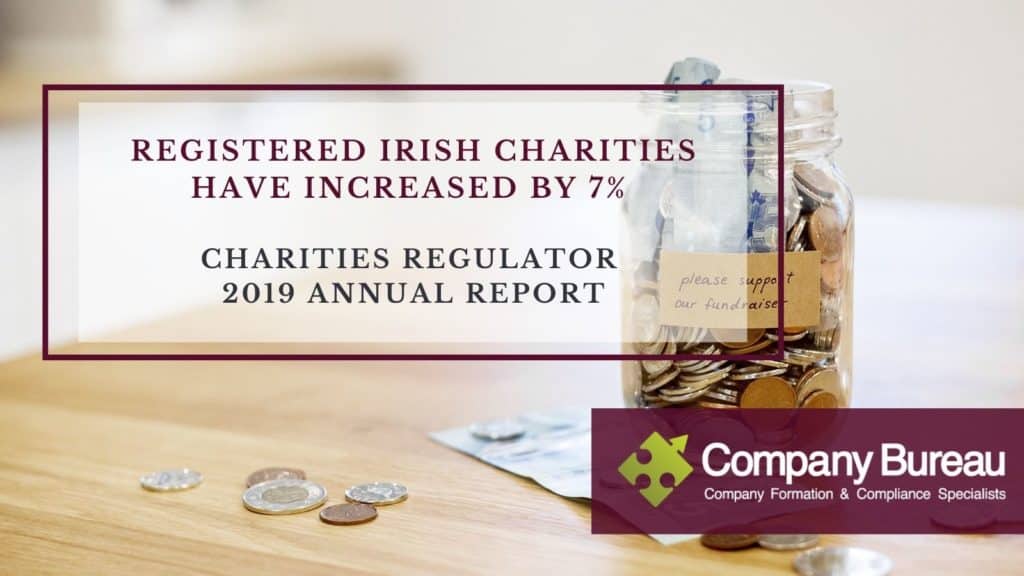Blog
Registered Irish Charities have increased by 7% according to the Charities Regulator 2019 Annual Report
By Caitlyn Buchanan, 2nd October 2020
The Irish Charities Regulatory Authority (CRA), published their 2019 annual report in July 2020. The report showed that the number of Registered Charities in Ireland has surpassed 10,000!
As of 2019, there were 10,514 charities listed on the public Register of Charities, a 7% increase (715) from 2018. This is fabulous news for Ireland, charities are essential for creating positive change and offering viable solutions to societal challenges. The 2019 report shows that there are a large range of charities currently in operation and working to address a large variety of issues. The following article summarises key findings and information on registered charities in Ireland.
Charitable Purpose
Under the Charities Act 2009, the purpose of that the charity must be categorised under one of four specific categories. The following breakdown shows the current registered Irish charities operating in each category:
- Benefit to the community 54%,
- Advancement of education 30%
- Relief of poverty/economic hardship 9%
- Religion 7%
Performance of Irish Charities
Registered Irish Charities are non-profit entities; this means that any income generated is reinvested into the activities of the organisation. Individual charities must file annual reports that provide information on the activities of that charity. The organisation must also demonstrate how its funding is used for public benefit. This is required to show compliance with the requirements set out by the Charities Regulatory Authority (CRA).
Annual Income:
| Percentage of all Charities | Annual Income |
| 52% | more than €100,000 |
| 32% | between €10,000 and €100,000 |
| 16% | less than €10,000 |
There were 2,165 charities which reported an annual income of over €250,000 in 2019, 875 (40%) of those charities had income more than €1 million.
Legal Forms of Charities
Charities can be established as one of three legal forms; incorporated, unincorporated or charitable trust. Charities on the Register of can be broken down in following way:
| Legal Form | Type | Amount | % of Total Register |
| Incorporated | Companies | 4,660 | 44.3% |
| Unincorporated | Association
Board of management (schools) Other |
1,589
2,861 785 |
15.3%
27.2% 7.5% |
| Charitable Trust | Trust | 619 | 5.9% |
| Total | 10,514 |
Incorporated Companies
This is by far the most common structure, nearly half (44%) of all charities on the register are incorporated companies. Generally, a company that intends to apply for charitable status would be incorporated as a Company Limited by Guarantee (CLG) prior to the application. CLGs have directors and members; there are no shareholders to pay dividends to, all the profits are reinvested into the company. This makes CLGs suitable for a non-profit company structure.
Unincorporated Entities
These entities do not undergo the incorporation process instead they are registered as an extension of the individuals who own them. Any newly formed Unincorporated Entities would be registered as either a sole trader or partnership. Existing entities may have been registered as a Friendly Society or Cooperative, but this is no longer possible following the enactment of the Friendly Societies and Industrial and Provident Societies Act 2014.
Charitable Trust
The charity trustees include committee members and company directors who ultimately have control and the legal responsibility of running the charity.
Compliance of Charities
In November 2018, the CRA launched the Charities Governance Code, which defines the minimum standards registered charities in Ireland must meet to effectively manage and control their organisation. Please visit our previous blog to read about how to maintain Compliance for Irish Charities.
If you would like to more information please click here to view the full CRA 2019 Annual Report. Alternatively, if you are interested in learning more about how to establish a Charity in Ireland or the compliance requirements please contact us on 01 6461625 or complete our contact form. A member of the Company Bureau team will contact you within 24hrs.
Disclaimer This article is for guidance purposes only. It does not constitute legal or professional advice. No liability is accepted by Company Bureau for any action taken or not taken in reliance on the information set out in this article. Professional or legal advice should be obtained before taking or refraining from any action as a result of this article. Any and all information is subject to change.


